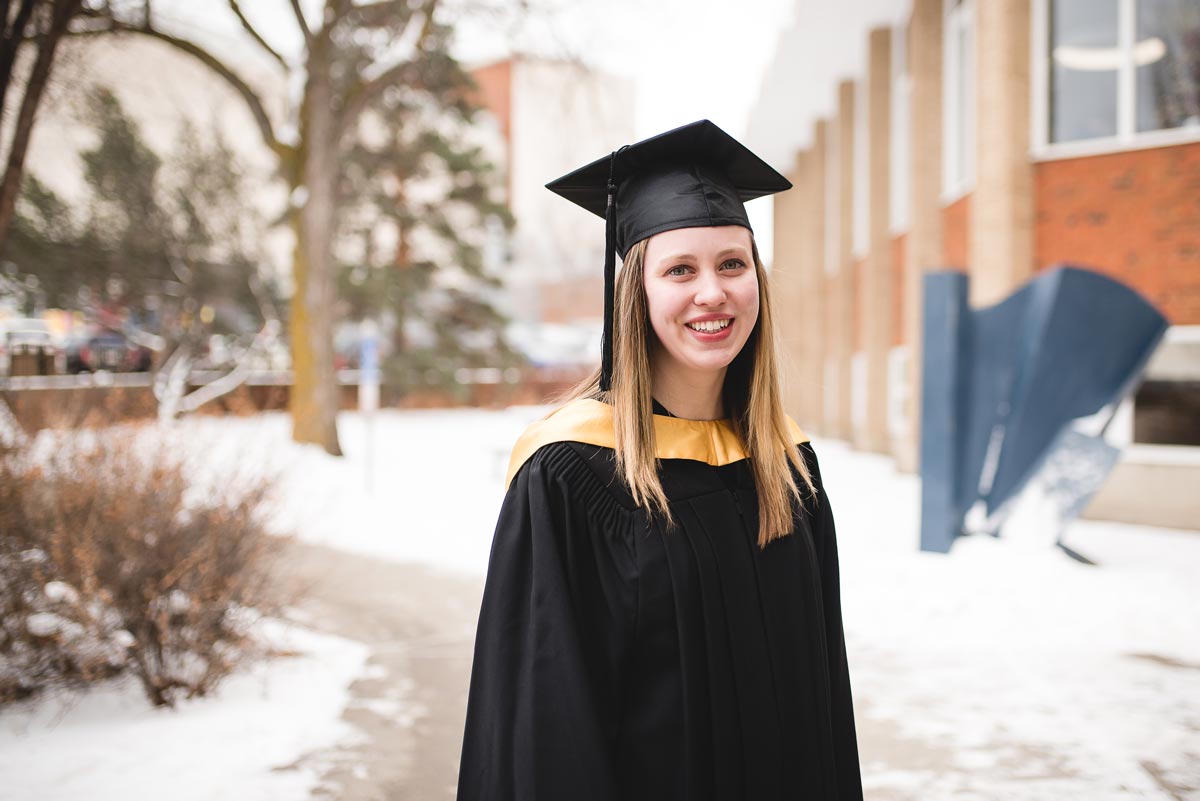
Courtney is graduating with a Master's in Biological Sciences, and is currently working on her PhD. As a PhD student, she studies the impact of emerging parasites and pathogens on honey bee health.
Faculty members, staff, friends, parents, and fellow graduands - welcome and congratulations! It is a real honour for me to be speaking to so many incredible minds today. I first started to write this speech while visiting Copenhagen not so long ago! Before I started to write, I spent several hours thinking to myself "what sort of inspirational or motivational story can I possibly share with everyone, given that I myself have very little life experience?" I thought of honey bees, as what little life experience I do have comes from working with them. "The bee's life is like a magic well: the more you draw from it, the more it fills with water" - Karl von Frisch. The bee's life is a lot like education in my opinion, you often get out of it what you put into it. I couldn't seem to shake myself of these two themes, education and honey bees, so I've decided to share with you what I've learned and experienced here at the UofA these last few years through honey bees.
Before arriving here at UofA, I had zero experience working with honey bees, I just found them incredibly fascinating. Age-based division of labour, honey production, communication through dance, what's not to love?! I mean, just think of how great it would be if someone could tell you where the brownies were through dance! Steve Pernal and Andy Keddie, my graduate advisors, thought my fascination with honey bees was enough to take a chance on me, so I took a chance on honey bees, and I haven't looked back. Do not be afraid to take a chance.
For me, a trip to the bee yard, especially on a warm summer day, is an ethereal experience - the movement of foraging bees across fields as they travel between their colonies and sources of pollen and nectar, the smell of beeswax and burning burlap in a lit smoker, the sound of cracking two honey supers apart, the low buzz of busy bees, the smell of blooming flowers in nearby fields. It is easy for me to lose track of time, and I haven't even really opened a colony yet! I have learned that this is so important, to be in your element, in an environment that you can enjoy going to every day even if you know that the work is going to be tedious and difficult at times.
You learn very early on in beekeeping (before ever opening a colony), that you MUST respect the bees. If you don't they'll become irritated, you'll be irritated (and likely in some pain), and this makes it difficult for you to do your tasks well. Respect yourself and your work enough so that you will always be proud of what you do.
Actually opening a honey bee colony is like having a bird's eye view into a different world. For me, just watching the bees is addictive. It's incredible to just watch them walk around on the comb, deposit pollen loads, antennate with one another, and of course, dance. I'll never forget the first time I saw a bee doing the waggle dance, my face hurt from smiling for the rest of the day!
One of my favourite things about honey bees is that you learn something new almost every time you work a colony, and you almost always leave the bee yard with more questions than answers. In my time here at UofA, I've learned that the key to good research is to ask good questions. The best way to ask good questions, I think, is to just keep asking questions.
In conclusion, I would like to draw a parallel between honey bees and scientists. Honey bees are altruists, they always do what's best for the entire colony and not the individual. I think that scientists are also altruists, we often run crazy experiments and work grueling hours in an effort to contribute knowledge to a community. Science is often a labour of love. "The bee is more honoured than other animals, not because she labours, but because she labours for others" - Saint John Chrysostom. I think scientists are pretty great, too!
Cheers to the Class of 2017, we did it!
What has been your most memorable experience at the Faculty of Science?
My experience at UofA has been shaped through all of the wonderful opportunities I've had to develop my skillset as a researcher. I've been able to attend several scientific conferences and beekeeping meetings across North America to share my research with scientists and beekeepers. It has been through these meetings that I've developed a passion for applied bee research and extension work in apiculture.
What is next for you after graduation?
I am currently enrolled in a PhD programme here at UofA where I will be studying the impact of emerging pathogens on honey bee health.
What advice do you have for your fellow students in the Faculty of Science?
I have three pieces of advice for students: don't be afraid to take chances, never stop asking questions, and do what you love.
Each year, the Faculty of Science recognizes those graduates with outstanding academic achievements and community contributions. For the class of Fall '17, we are pleased to celebrate Courtney MacInnis. Courtney is graduating with a Master's in Biological Sciences, and is currently working on her PhD, studying with Lien Luong, Assistant Professor in the Department of Biological Sciences. As a PhD student, she studies the impact of emerging parasites and pathogens on honey bee health. This project builds upon her MSc work, which looked at the survival of an enigmatic parasite of the honey bee.